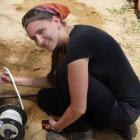
Programme Officer
Mélanie is a water and sanitation engineer working in the WASH sector since 2002. She worked 5 years in the private sector in hydraulic design and construction followed by 7 years in the humanitarian and development sector. Mélanie has an extensive field experience as WASH programme manager and coordinator mainly in emergency contexts, and was based and worked in various countries in Africa, Asia and the Middle East.
She joined IRC in 2012 as a Programme Officer and has been involved in various research and monitoring initiatives, mainly in the field of sanitation, hygiene and MUS (Multiple Use of water Services). Mélanie is the facilitator of the online life-cycle costing training and is working with UNCHR to adapt the life-cycle cost approach to emergency contexts.
Languages: English, German, French, Spanish
Sustainable groundwater use is more likely in Indian villages if farmers, other village community members and NGOs work together with researchers and... Read more...
Etude de cas des latrines EcoSan dans le cadre du projet d'appui à l'assainissement familial dans 12 communes rurales des régions du Plateau Central... Read more...
This policy brief highlights lessons emerging from use of Sub-county Boards in Uganda to strengthen O&M for rural water supply facilities. Read more...
Increasing latrine coverage does not by itself reduce exposure to faecal pathogens and prevent disease. Read more...
IRC is developing a methodology to measure behaviour change in the context of a sanitation programme promoting EcoSan latrines. Read more...
IRC updated its ladder to measure effectiveness of hygiene interventions, which is breaking down hygiene practices according to categories, and that can be used to compare the "before" and "after" behaviour of a beneficiary, for a given intervention. Read more...
IRC développe une méthodologie permettant de mesurer les changements de comportements dans le cadre d’un programme d’assainissement mettant en œuvre des latrines EcoSan. Read more...
IRC a mis à jour son échelle de mesure d'efficacité des interventions d'hygiène, qui décompose les pratiques d'hygiène en catégories permettant de situer les comportements d'un bénéficiaire entre un "avant" et un "après" une intervention. Read more...
What about looking deep into on-going WASH programmes and analysing their strengths and weaknesses? What about designing innovative ways of measuring the effectiveness of these approaches? And what about testing adjustments to their activities to make the interventions even more effective? Read more...
Governments need to create an accountable and enabling environment for non-state entities that ensures they provide affordable, demand-driven... Read more...